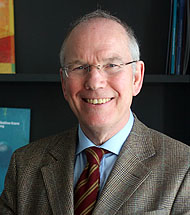2014_04_09_ICS_Si los cuidados paliativos se vuelven rutinarios, se puede perder el enfoque espiritual y familiar
"If palliative care becomes a routine, the spiritual and family perspective can be lost"
A Professor from the University of Glasglow gave a conference by the ATLANTES program of the University of Navarra

"If palliative care becomes a routine, you can lose the spiritual and family perspective," stated David Clark, professor and researcher at the University of Glasgow (United Kingdom). The expert gave a conference on 'Cicely Saunders: the Life, the Work, the Legacy', organized by the ATLANTES program of the Institute for Culture and Society (ICS), led by Dr. Carlos Centeno.
As the British specialist said, palliative care is one of the most important health related issues of the 21st century due to medical advances that have increased life expectancy. Today there are more people who are living with a disease and symptoms for a longer period of time.
"It is necessary to train professionals in order to resolve the lack of proportion between patients who demand palliative care and the number of health professionals available," he said at the ICS.
The importance of intangible aspectsDuring his speech, Dr. Clark emphasized the importance of the "intangible aspects" of palliative care, which "must be understood and investigated." To illustrate this idea, he looked over Cicely Saunders's life and work, one of the founders of the modern palliative care movement. She was the first one to establish the first specialized unit in this field, St. Christopher's Hospice. He stated that "this center was an area of influence because it was different from other centers at that time and apart from caring patients, it also organized educational and research programs."
After continuing with the work begun by this pioneer, David Clark stated that next year he will be conducting an investigation with his team at the University of Glasgow to research alternative approaches on how to make the end of life more sustainable with palliative care.
